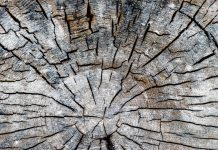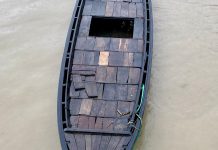They were tiny, two-pronged, lying brown or green in the soil or moss. Sometimes they edged a stone a fraction forward to trip walkers or moved slithery leaves onto paths where they would skid. They liked watching people. They liked to see the way gravity played with them, snapping them hard to earth and making them yell and gush red, and they loved to see it pull a man out of a tree and break his leg against the ground. They mostly lived in the woods, but sometimes in bright sunlight they might drift down a hill to a lake and become transparent on the water, maybe making waves to tilt a boat.
On one of those splashy jaunts, they spotted it. It was just beyond the lake shore, a massive tree sprawled on the ground with its roots in the air, the great achievement of a storm. They studied it for a long time. It had fallen almost in line with the edge of the lake and its green leaves still rustled in the wind, as if they didn’t know yet how much their lives had changed. They watched because in the forest, a tree rarely fell to the ground like this; when it creaked and gave way it might stay propped up by other trees through several winter and summer times. But this collapse was spectacular. They wished they could do something huge like that, but they were only tiny, nudging things.
Some time after that they found a cloth on the ground, thought it had probably fallen from a person-neck, and examined it closely where it lay. It was a beautiful mix of red and tan colours, like a mesh of autumn leaves. It was made up of soft loops that each sat on another and gripped the one above, at the same time linking with the ones on either side. After swarming under and above it many times, a thought wave started: these loops look a bit like us. And daring to wonder, could we do that? All line up, have every one grip the one above and the one to the left, say, and become a shape, maybe even a big shape? They started dreaming.
In a gap in the trees where light fell through onto the forest floor, they practised. They had all the time they wanted, because they didn’t count time. It could be days, or years, or generations, before they could make even a basic shape. They hoped that this knit together thing wasn’t so different from what they did all the time, gripping each other to nudge something forward or ease something back. But they had always joined together in straight lines, to play games of tug-of-war or battle where they had to hold tight. The hard part now was to go beyond that and make a shape. And to concentrate. One or two always got bored and fell out, leaving rip holes in the wobbly knit they’d made, or the sun might rise high and tempt others to laze in lovely shifting pools of light under the trees. There were always interesting sounds and smells to follow in the woods, stray breezes to rush along with or slide down.
A time arrived when they could do it. The first shapes they managed were blobs, then they formed into a rough square. Soon some better squares appeared, and a narrow strip, but there was barely a chance to celebrate before it all dissolved again and some of the team wandered off. That was until the moment when a new idea landed on a cluster of them, and quickly shuddered through the group. It was a dream of an enormous hand, a hand that could fasten around a tree.
They had always liked to call themselves hands but were too minute to imitate the ones they’d seen dangling by the sides of people, with multiple fingers and a grip. But now that they were learning to work together, maybe they could mould themselves into a single big hand? Then they might be able pull up a tree at night and watch for gasps at the floored giant in the morning! Maybe that was what they wanted all along. They were hands, of course they were, and together they would become a magnificent one!
So, after several days, or years or generations, something like a five-pronged hand took shape. One team formed the thumb; there were four teams of fingerers, and the rest made up the palm. The main thing then was to figure out how to grip. If they could just think as one, and hold as one, and move as one, that was all it would take. With fierce concentration they tried it, failed, and failed again. It was a lot harder than it looked. First they blamed the twigs and small branches they were trying to wrap around, then the light, then reluctantly their own clumsy moves. When the first stalk stayed within their grasp they could feel the thrill, the need to do damage, to exert their force against the stubborn earth. After endless efforts with different plants and shrubs they had flattened many, most of them bouncing back but some actually loosening, throwing crumbs of soil into the air.
Now they had to choose the right tree, one that would keep every one of them happy. There were trees too big to tackle, too small to be worth it, too wispy or too cramped. But the excitement was huge, and the waiting unbearable! They didn’t want a gradual build up to something big; they wanted a spectacular, and they wanted it now. In the end they settled on a substantial oak by the lake, just tall enough, and with enough room to fall where it could be seen and marvelled at.
They gathered around it at first light, thought it looked a lot bigger now they were so close, and found they needed a long time to mesh themselves together. The various teams formed and waited, then the thumbers, fingerers and palmers joined up, and the massive hand moved to settle around the trunk. They started to heave. They pushed and pulled in every direction, until they could feel the hugeness of the root system below, as big as the tree itself! Something they hadn’t considered was that it would be tangled up in other roots. They felt all the resistance of the earth now, heard a small strand cracking, then another, while they pushed all the way back and pulled all the way forward. Their big hand gripped the trunk fiercely, straining to twist and yank, but the ground was holding on, the tree swaying between worlds. They fizzed and gasped and spluttered with the effort of it.
Then the moment came – the give, the whole lot jerking up and knocking them all back, the root ball thick with packed earth and a big crater under it, a heavy scent of soil, loose brown clods everywhere, clayey creatures franticly dealing with the gash. Birds hopping along the edges, furious to investigate. The tree crashed to the ground with the thud still reverberating and the hand shaking the clods off, rough bark scraping their big palm, uprooted branches rustling. Themselves laughing and yelping, and their big hand exploding back into all the little hands again with the joy of it.
Yee! Tree!
The fallen hulk was thoroughly examined, its girth and length on the ground, and the myriad creatures that lived in it, some even smaller than themselves. Many were stranded now and would have to scurry around for another place or were going to die. Others were already discovering it, delighted with the sudden continent of dead wood they could live sumptuously on. The hands surveyed, they danced and floated, they sang, and they bickered.
The mutiny started in the thumb. The thumbers knew they had worked harder than the rest, and in isolation, using a different motion from the fingerers that just had to mimic each other, or the dopey palmers that just clung. The whole operation depended on the thumbers in fact, but nobody seemed to appreciate that! Now in the debate about the felled tree they felt they weren’t being listened to.
The fingerers were also thrilled with their achievement but were becoming uneasy. They had heard the terrible tearing when the tree was wrenched from the ground, and the sound had stayed with them. They had a huge urge to put it back in the hole again, spread leaves and moss over the disturbance, and hope it would re-root. The thumbers wanted to leave it as it was. Why hide what you’ve achieved, when you’ve made such a powerful mesh out of your insignificant little selves? The palmers were split down the middle: some siding with the thumb, others with the fingers. Hand jostled hand as they argued, the fingerers at one stage trying to grab onto the tree and raise it themselves but finding that without a thumb they were useless. Things got ugly when the fingerers tried to close around the thumb like they had around the tree, but the thumbers easily unmeshed and melted through their grasp. This battle would have to be fought some other way, by proxy. Whoever did the most damage would win.
Uprootings soon left the home woods devastated. The fingerers forgot entirely that they had been against all destruction, and reinforcements were called in from other woods to fight on one side or the other. They were surprised and excited by what they saw. They joined in fights that spread like forest fires, until they covered huge areas. Trees were pulled up, streams diverted and boulders rolled, leading to road blockages, landslides, floods.
Everything was frenzied now. They were drained from the effort and from planning new attacks but dazzled too with ideas for even bigger things. Buildings flattened and humans felled, why not? Mountains moved! Some even talked about controlling the sea, making it fold in over the land – or maybe making it surge up rivers, popping bridges as it went. They were so small, and yet. ‘So many of us,’ they chanted, ‘so many!’
#
Many days, and years and generations had passed since the glory tree, their first. They remembered it vividly, even those who hadn’t been there, because the story had passed down to them and they all felt they could relive that wonder time. There were differing accounts of what had happened to the tree after they had all rushed off to fight. One was that people who saw it had stood in shock and wonder. Others said that men with noisy machines had come and cut the huge trophy into little pieces right there on the ground, and had taken all the pieces away, leaving nothing behind but tree dust. The hole had been filled in too, they said, and a small, very spindly tree had been seen sticking out of the fresh earth, the only record of their great feat.
Neither side could now remember what the war was about. Was it that they all originally wanted to be in the thumb, but were needed elsewhere? Or were the first attacks against the palmers who weren’t pulling their weight, daydreaming when they should have been focussed, putting more pressure on the rest? The battles dragged on and were ever more exhausting, until gradually, barely noticed at first, one side thinned out. In ones and twos they started to drift away, until the time came when there was no-one left to fight on that side. A strange silence came down on the rest. They gave a few cheers to break it but were themselves dead tired. They huddled in circles and stayed very still, hearing only the wind.
They started dreaming about their home forests and sang quietly to remember. After a time they were singing about the battles too, daring deeds and triumphs, to cheer themselves. They debated which were the best days and were generally in agreement. The very best days were when they saw a solemn human at a battle site, holding a small black stick to the face and talking towards a big black box. Obviously paying homage. Obviously in awe.
About the Author
Margaret Irish’s fiction has appeared in The Stinging Fly, Grain Magazine and Short Fiction, among other journals, and her plays and stories have been broadcast on RTE radio. She lives in south-east Ireland.












